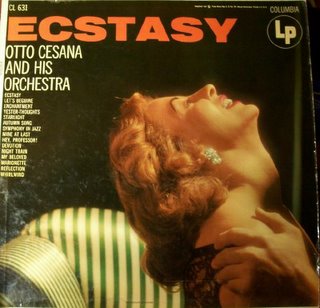"Ecstasy," again
One can never get enough ecstasy, I always say. Well, actually, I've never said it. But I just typed it. (Please bear with me--I'm half-asleep!)
Anyway, I'm about to repost the seven Otto Cesana tracks I posted a while back in (let's see) February, and I am currently swiping the HTML code for the cover photo so that I won't have to upload it again. Here we are:

"Honey? Honey?? Wake up!! Oh, my God...."
The 1955 LP pictured above was a reissue of two earlier Otto Cesana efforts, including a 10-inch 1953 LP of the same name. (The old reissue-with-the-same-name trick.) Thus, all of the tracks on Side One are from 1953. And all of the tracks on Side Two are from... dunno. But I'm guessing about 1951. That's the closest I've been able to date them.
Two of the better numbers on this one are unplayable due to a bad needle dig, else they'd be included, too. I can fix just about anything with my software, but I can't make my stylus go through cross-cut canyons. Jumping over them--no problem. Going through them--nope.
These seven gems will more than make up for the two I couldn't include. This is about the best easy listening material ever recorded, in this blog's opinion:
Otto Cesana and His Orchestra, 1953 and 195-? (All composed by Cesana):
Night Train, 1953.
Marionette, 1953.
Reflection, 1953.
Whirlwind, 1953.
Symphony in Jazz, early 1950s?
Ecstasy, early 1950s?
Starlight, early 1950s?
Lee
Anyway, I'm about to repost the seven Otto Cesana tracks I posted a while back in (let's see) February, and I am currently swiping the HTML code for the cover photo so that I won't have to upload it again. Here we are:

"Honey? Honey?? Wake up!! Oh, my God...."
The 1955 LP pictured above was a reissue of two earlier Otto Cesana efforts, including a 10-inch 1953 LP of the same name. (The old reissue-with-the-same-name trick.) Thus, all of the tracks on Side One are from 1953. And all of the tracks on Side Two are from... dunno. But I'm guessing about 1951. That's the closest I've been able to date them.
Two of the better numbers on this one are unplayable due to a bad needle dig, else they'd be included, too. I can fix just about anything with my software, but I can't make my stylus go through cross-cut canyons. Jumping over them--no problem. Going through them--nope.
These seven gems will more than make up for the two I couldn't include. This is about the best easy listening material ever recorded, in this blog's opinion:
Otto Cesana and His Orchestra, 1953 and 195-? (All composed by Cesana):
Night Train, 1953.
Marionette, 1953.
Reflection, 1953.
Whirlwind, 1953.
Symphony in Jazz, early 1950s?
Ecstasy, early 1950s?
Starlight, early 1950s?
Lee

